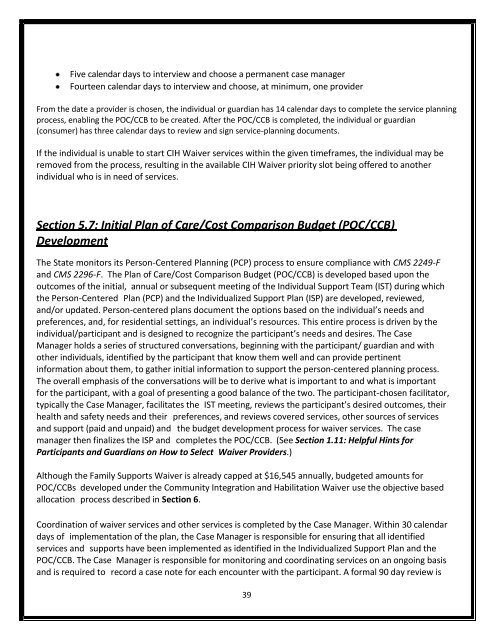DDRS Waiver Manual
2dXf5Pj
2dXf5Pj
Create successful ePaper yourself
Turn your PDF publications into a flip-book with our unique Google optimized e-Paper software.
Five calendar days to interview and choose a permanent case manager<br />
Fourteen calendar days to interview and choose, at minimum, one provider<br />
From the date a provider is chosen, the individual or guardian has 14 calendar days to complete the service planning<br />
process, enabling the POC/CCB to be created. After the POC/CCB is completed, the individual or guardian<br />
(consumer) has three calendar days to review and sign service-planning documents.<br />
If the individual is unable to start CIH <strong>Waiver</strong> services within the given timeframes, the individual may be<br />
removed from the process, resulting in the available CIH <strong>Waiver</strong> priority slot being offered to another<br />
individual who is in need of services.<br />
Section 5.7: Initial Plan of Care/Cost Comparison Budget (POC/CCB)<br />
Development<br />
The State monitors its Person-Centered Planning (PCP) process to ensure compliance with CMS 2249-F<br />
and CMS 2296-F. The Plan of Care/Cost Comparison Budget (POC/CCB) is developed based upon the<br />
outcomes of the initial, annual or subsequent meeting of the Individual Support Team (IST) during which<br />
the Person-Centered Plan (PCP) and the Individualized Support Plan (ISP) are developed, reviewed,<br />
and/or updated. Person-centered plans document the options based on the individual’s needs and<br />
preferences, and, for residential settings, an individual’s resources. This entire process is driven by the<br />
individual/participant and is designed to recognize the participant’s needs and desires. The Case<br />
Manager holds a series of structured conversations, beginning with the participant/ guardian and with<br />
other individuals, identified by the participant that know them well and can provide pertinent<br />
information about them, to gather initial information to support the person-centered planning process.<br />
The overall emphasis of the conversations will be to derive what is important to and what is important<br />
for the participant, with a goal of presenting a good balance of the two. The participant-chosen facilitator,<br />
typically the Case Manager, facilitates the IST meeting, reviews the participant’s desired outcomes, their<br />
health and safety needs and their preferences, and reviews covered services, other sources of services<br />
and support (paid and unpaid) and the budget development process for waiver services. The case<br />
manager then finalizes the ISP and completes the POC/CCB. (See Section 1.11: Helpful Hints for<br />
Participants and Guardians on How to Select <strong>Waiver</strong> Providers.)<br />
Although the Family Supports <strong>Waiver</strong> is already capped at $16,545 annually, budgeted amounts for<br />
POC/CCBs developed under the Community Integration and Habilitation <strong>Waiver</strong> use the objective based<br />
allocation process described in Section 6.<br />
Coordination of waiver services and other services is completed by the Case Manager. Within 30 calendar<br />
days of implementation of the plan, the Case Manager is responsible for ensuring that all identified<br />
services and supports have been implemented as identified in the Individualized Support Plan and the<br />
POC/CCB. The Case Manager is responsible for monitoring and coordinating services on an ongoing basis<br />
and is required to record a case note for each encounter with the participant. A formal 90 day review is<br />
39


